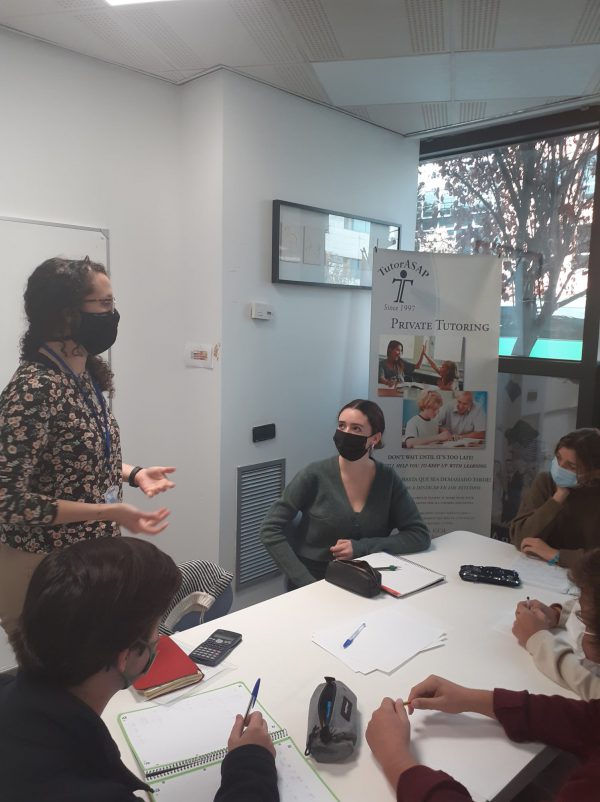UCAS: HOW TO APPLY TO UK UNIVERSITIES
The UCAS is the admission process for United Kingdom universities. UCAS is not just a process for England, it is for the whole of the UK, meaning that all territories are accessed in the same way, in a centralised way. Parents and students always have the same doubts and that is why it is very important to be clear about how it works and to have good advice.
RECOMMENDATIONS AS A BRITISH CENTRE AND OFFICIAL UCAS CENTRE FOR MORE THAN 12 YEARS
The first thing we recommend for applying to United Kingdom universities is to download the brochure from the UCAS website to apply as an international student. There you will find all the information about the process.
Before doing so, you should look for a maximum of 5 university degrees where you want to study in the UK. You can apply to the same university as long as you apply for a different degree, i.e. you do not have to repeat the course. For example, if you like a university and its philosophy very much and you are between several degrees and you don’t decide, you can put all of them (up to a maximum of 5). You have to see the 5 options as 5 opportunities, 5 choices.
The next, and very important step, is that you look at each of the careers and universities that interest you and their unique requirements. UCAS centralises the application process to British universities for all students coming from A-LEVELS, IB or the Spanish system. The figure of the ADVISERS is very important throughout this stage.
WHAT DOES AN ADVISER DO AND WHY IS IT SO IMPORTANT?
An Adviser, or Counselor, is the figure who is in charge of processing access to university for the schools. In Spain it is called a university adviser, guide or counsellor specialising in universities. In TutorASAP we have specialized Advisers for applications in different countries and different systems for more than 12 years.
Their role is to guide students through all stages and parts of the university entry process and ensure that the student has a successful application to UCAS. It is somewhat complicated because it requires a series of important and indispensable steps that they supervise and assist. Once all the steps have been completed, they will be sent to the UK.
STEPS IN THE UCAS PROCESS: THE PREDICTIVE NOTES
The student must register on the official website and once registered must fulfill a series of checkpoints: student information, previous school, grades, the options you want to apply or choices, etc.
The grades include the PREDICTED GRADES, which are provided by the student’s school and which will be used for the grades requested by the universities. The predicted grades determine the grades you can aspire to and the universities you can apply to. You aspire to what the school thinks you can aspire to. It is very important to get favourable predictions in order to be able to apply to the career and university you want. These predictives are two-year predictives (A levels, IB, Bachillerato), which is why they are predictive because not all the exams have been taken yet.
Many times the students do not agree with the predictive tests that their school has done, there for example we as a centre give the opportunity for the student to show us that he can do better and improve those predictive tests so that he can opt for the career he wants.
THE PERSONAL STATEMENT OR MOTIVATION LETTER
The PERSONAL STATEMENT is very common for many applications: the private ones in Spain have, in the Netherlands, in Sweden, in the UK and more. This is a LETTER OF MOTIVATION, translated into Spanish.
It should be a presentation with a maximum number of words where the student introduces himself, talks about himself, telling about his aspirations, motivations, his own unique abilities, etc.
Why is it so important to make a correct Personal Statement? Because in UK universities it is decisive when there is equality in grades: they use the Personal Statement as a tiebreaker. It is a sign of the maturity of the type of student and sometimes, when they see an extraordinary student, the universities ask for an interview with the student. And that can then provide benefits, such as scholarships, a lower entry mark, and more. The Advisor, because he or she is experienced and a true professional at it, will help the student.
 LETTER OF RECOMMENDATION FROM THE SCHOOL
LETTER OF RECOMMENDATION FROM THE SCHOOL
On behalf of the school, they must make a letter of recommendation to the student. IMPORTANT KEY: not to be done by a person who does not know you, because it has to be something unique, a document that shows the abilities that the student has demonstrated in that centre. If you are an outstanding student even sometimes the director of the school itself will do it for you.
DATES TO APPLY TO UK UNIVERSITIES
There are two:
– 18 October are the applications for Oxbridge: Oxford University and Cambridge University, in addition to certain careers such as medicine, veterinary medicine, biochemistry and more that have a very specific health science component. To find out what date corresponds to your degree, go to their website and get the information.
– 15 January are the applications for all other universities and careers in the United Kingdom.
UNIVERSITY DECISION-MAKING PROCESS
After the application dates, universities have a maximum time for decision making but it is usually on March 15 when they respond (unless the process changes due to the COVID, so be on the lookout).
Before they respond, each university has to give you a report, which you have also put in order (you usually put the degree course and/or university that motivates you the most first, from 1 to 5, at the most). If they see a candidate they like very much, they make them offers, negotiate. If no one catches you, you go directly to CLEARING.
The people who are Advisor know what strategies to use for the applications and the order of them, depending on the goal and objective of each student.
VERDICT OF THE UNIVERSITIES: POSSIBLE OPTIONS
– Conditional offers: When the university informs you that the place is yours, but it is conditioned on you getting the grades, since with your predictions it doesn’t count, you have to get it.
– Unconditional offers: When your grades are closed, you are in and in this case your place is no longer revocable because you are not applying to a probability, but with your exams done and your grades certified.
– When the grade comes out and you don’t have the grade they are asking for, the CLEARING process starts. It is a process of OFFERING universities with places still available so that students who have the requirements but do not yet have a place can apply. There is no ranking here: if you have a grade and you apply before anyone else, you keep it. Let’s say “first come, first served”.
– When you don’t reach that grade predictably but then you exceed that prediction and get a higher grade, in this case you can revoke it and try for other races if there are places left by doing PROMOTION upwards. It doesn’t matter in which university. For example, you put in nursing but the final grade gives you for medicine. If there were places, you could get in.
WHEN DO THE OFFICIAL GRADES COME OUT?
The grades come out around the 15th of August.
If you have any questions, please contact our educational advisors, Advisors, for personal advice. Call us at 911 274 432!
MORE RELATED CONTENT…





Comments